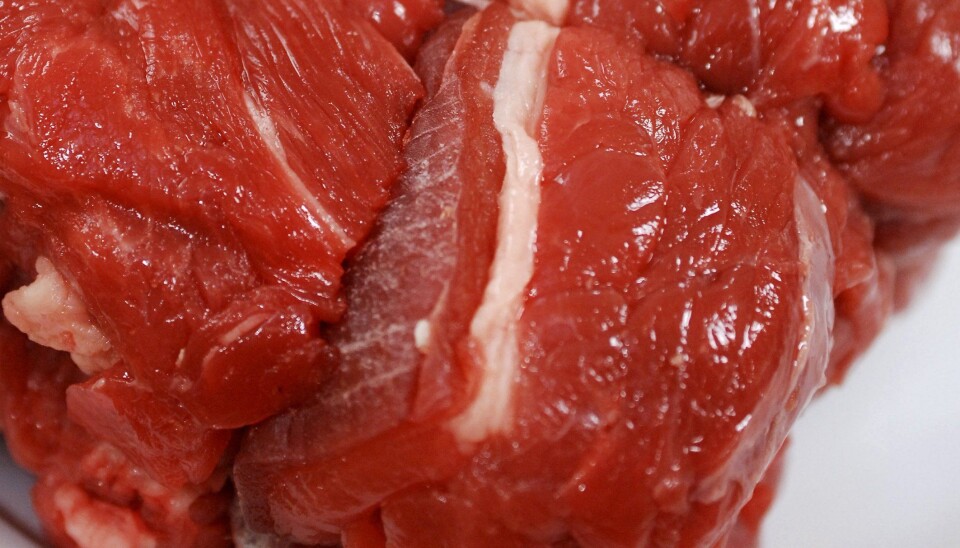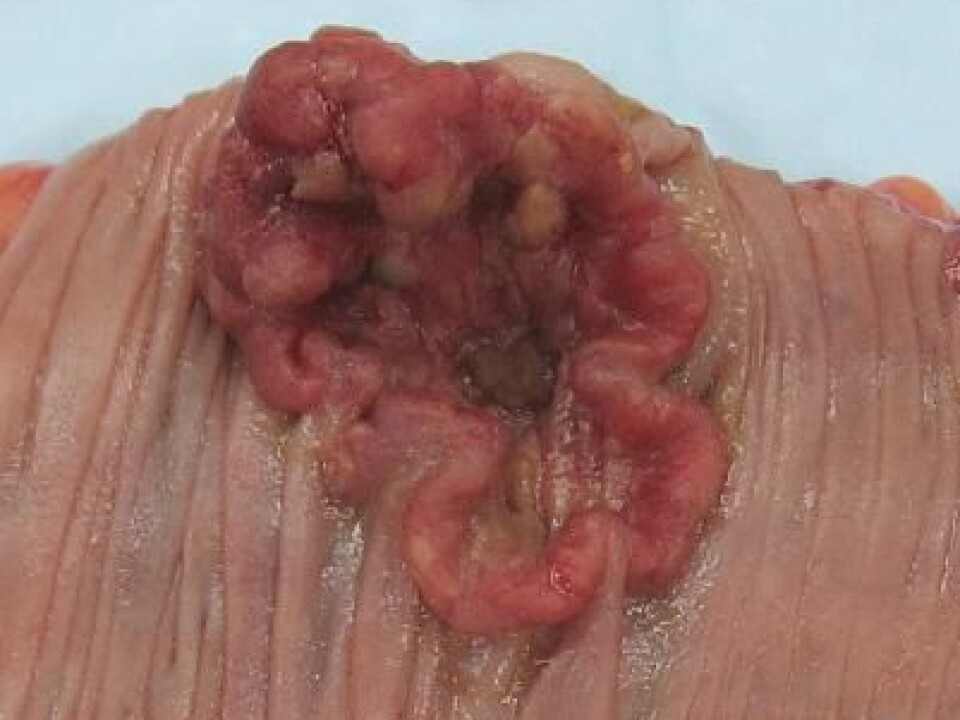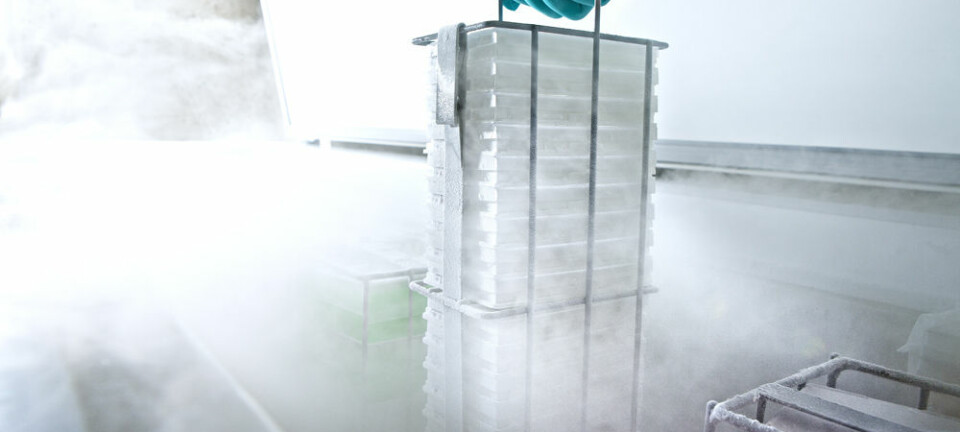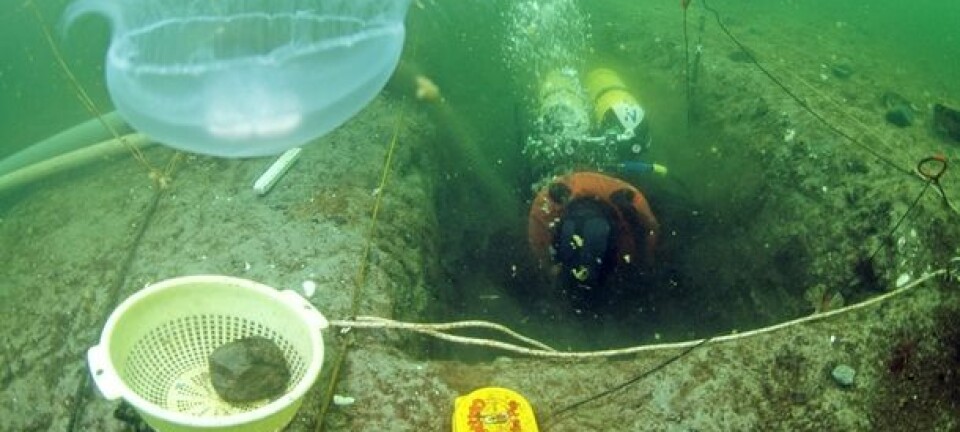This article was produced and financed by Norwegian School of Veterinary Science

Would you prefer to be thin or get bowel cancer?
The ongoing debate about low carbohydrate diets is far from over. Research shows that a bad diet is a more likely cause of cancer than tobacco.
Denne artikkelen er over ti år gammel og kan inneholde utdatert informasjon.
Red meat, which is an important component of many so-called "low carb diets", can lead to a significantly higher risk of getting cancer of the colon. Why? Norwegian Professor Jan Erik Paulsen is going to find out.
The fact that what we eat can result in a higher occurrence of cancer is well known. About 40 percent of all forms of cancer can be prevented by eating a well balanced diet, maintaining a normal body weight and engaging in a moderate amount of exercise.
These are findings described in the report "Food, Nutrition and the Prevention of Cancer: A Global Perspective", which was commissioned by the World Cancer Research Fund and published in 2007.
The report represents the most extensive and systematic report on the subject, involving 286 specialists. The panels of experts went through 500,000 scientific articles concerning 17 different types of cancer.

Food is an important factor when it comes to the development of all forms of cancer. Research has shown that a bad or inadequate diet can be at least as carcinogenic as smoking.
"But we do not know enough about which factors are the most likely causes and which forms of cancer are most affected by nutrition," says Paulsen.
"Our research is part of the numerous projects being carried out in many countries to find out which foods are the most carcinogenic."
False prophets
Paulsen is annoyed by all the advice from self-proclaimed "diet experts" who recommend extreme diets of one kind or another, especially those of the "low carb" variety.
"An unbalanced diet with a lot of saturated fat, red meat and other sources of protein goes against official dietary advice. I recommend everybody to follow the health authorities' advice. You can't solve a health problem if you introduce a new one," he says.
He recommends a diet consisting of a balanced amount of carbohydrates, fats and proteins. The healthiest diet is to avoid exaggerating in any direction. But limit as much as possible your intake of sweets and alcohol, eat enough fruit and vegetables – especially greens – eat wholemeal corn products, less red meat and more fish and get enough exercise.
Paulsen is particularly critical to low carbohydrate diets that recommend red meat, i.e. beef, pork, lamb and game. People who eat large amounts of red meat in order to keep their weight in check can end up getting cancer instead, he warns.
From mice to mankind
Research has shown that nearly all colorectal tumours occur when a particular gene in the surface tissue of the colon stops working. This gene, which normally prevents cancer developing, is called Adenomatous polyposis coli (APC).
If the APC gene is to stop working, the stem cells in the surface of the colon must suffer from a genetic defect in the APC in both chromosomes. Stem cells are the cells which make new cells in the body, and each gene consists of two chromosomes, one from the individual’s mother, one from the father.
"In order to develop, cancer is therefore dependent on two APC hits and there is reason to believe that carcinogenic substances in food are the main cause of this," says Paulsen.
The NVH researcher has developed a model for colon cancer using mice, where the mice have a hereditary gene defect in one of the two APC chromosomes. Because of this, they are particularly sensitive to carcinogenic substances that can damage their APC.
"We feed the mice with different kinds of fodder, including red meat and see if they develop a defect on the other gene. This allows us to follow the development of colon cancer from the very earliest stages," explains Paulsen.
Around two percent of colon cancer occurring in humans is due to an inherited mutation in their APC. This form of hereditary colon cancer is called (Familial Adenomatous Polyposis (FAP). But Paulsen's mouse model is equally as relevant for people without the genetic disorder because sporadic cancer of the colon in patients without the inherited disorder can also start when their APC stops functioning.
Dangerous nitrite
It has long been suspected that nitrite can be carcinogenic, but in spite of extensive tests on animals, this has not been conclusively proved. Even though nitrite in itself does not cause cancer, it is plausible that a combination of nitrite and other components in food can produce carcinogenic substances.
Previous research shows that people who eat a great deal of processed red meat, especially meat processed by means of nitrites, have a greater risk of developing cancer of the colon than those who eat unprocessed red meat.
Paulsen focuses particularly on heme iron, which is found in myoglobin, i.e. the substance that makes meat look red, and which also binds oxygen. When heme iron reacts with nitrite, a compound called nitrosyl hemoglobin is formed, which can trigger bowel cancer.
"My theory is that this compound is so stable that it survives the digestion of meat in the small intestine and goes on undamaged to reach the colon. Here it reacts with the metabolites - the intermediate and end-products of metabolism - which are produced by the bacterial flora, and forms nitrosamines, which are known to cause cancer," says Paulsen.
He is not only concerned about meat treated with nitrite. Unprocessed red meat can be just as dangerous. He explains how unprocessed meat can find nitrite in the stomach and form nitrosyl hemoglobin:
"We can absorb nitrites by eating vegetables, especially green-leafed vegetables. These vegetables actually contain nitrate which is not dangerous. But bacteria in the throat can convert nitrate secreted in saliva to nitrite, which then ends up in the stomach."
Paulsen emphasises that he does not mean that we should give up eating salad and other vegetables.
"I by no means recommend people to stop eating vegetables, because they contain many important nutrients. But if our theory turns out to be true, I will advise people to each much less red meat," he says.
-----------------------------
Read this article in Norwegian at forskning.no

































